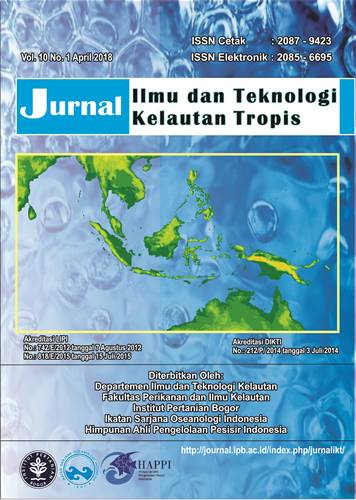THE EFFECT OF ORGANIC SEDIMENT CONTENT ON CORAL DIVERSITY IN KARIMUNJAWA ISLAND, INDONESIA
Abstract
Coral reef now are under threats due to sedimentation. Fatal effect of organic rich sediment, leading corals mortality. Therefore, the study was conducted to investigate effect of organic sediment content to the coral diversity in Karimunjawa Island, Central Java, Indonesia. Field data was conducted at 6 locations. Three sediment traps were deployed at each sites to measure organic sediment content. Twenty replicated quadrant transects were used to estimate coral density and coral diversity. Analysis of variance (ANOVA) was used to examine the differences of organic sediment content in each station. The linear regression was used to assess the relationship between organic sediment content and coral diversity. Our field result demonstrated that sediment content significantly different between sites with value range from 0.42 mg/800 ml - 1.32 mg/800 ml. Based on the Simson’s Diversity Index, the highest coral diversity found at Alang-alang as site with low sedimentation while the lowest coral diversity was found at Legon Lele as site with high sedimentation. The study shown significant negative correlation between organic sediment content and coral diversity with the coefficient of regression 0.68. This study convinces that disturbance on coral reefs might affect coral diversity in Karimunjawa Island, in addition to other factors such as the influence of human activities, natural disruption and climate change.
Keywords: sedimentation, organic, coral, diversity, Karimunjawa
Authors
This work is licensed under a Creative Commons Attribution 4.0 International License.
Jurnal Ilmu dan Teknologi Kelautan Tropis i is an open-access journal, meaning that all content is freely available without charge to the user or their institution. Users are allowed to read, download, copy, distribute, print, search, or link to the full texts of the articles in this journal without needing to request prior permission from the publisher or the author.
All articles published by Jurnal Ilmu dan Teknologi Kelautan Tropis are licensed under the Creative Commons Attribution 4.0 International License. This allows for unrestricted use, distribution, and reproduction in any medium, provided proper credit is given to the original authors.
Authors submitting manuscripts should understand and agree that the copyright of published manuscripts is retained by the authors. Copyright encompasses the exclusive rights of authors to reproduce, distribute, and sell any part of the journal articles in all forms and media. Reproduction of any part of this journal, its storage in databases, and its transmission by any form or media is allowed without written permission from Jurnal Ilmu dan Teknologi Kelautan Tropis.


